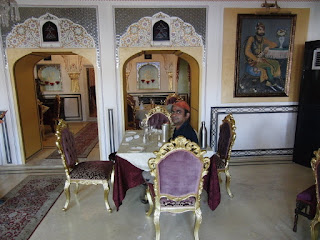Even as our media keeps its focus on Srinagar and Kashmir, it has forgotten the peaceful and docile people whose land Kashmir originally was, and who fled from the violence and massacres: the Kashmiri Pandits. On Christmas Day, I went to one such Camp for the Migrants, set up in Shahdara, along the Yamuna Riverbed. The camp was surrounded by mountains of garbage and shit, and the sanitation and water supply primitive. Surrounded by slums inhabited by the vast numbers of immigrant workers who keep Delhi turning, the Pandits Camp is a sad and pitiful place, a reminder of how they have been let down, not only by the Government, but by everybody else.
I asked them about how they manage to educate their children, and they simply said " We teach them ourselves." I had forgotten that this was a educated, middle-class community, who preferred to flee than go the Israeli settler way, and move around with a submachine strapped to their back.
A bird's eye view of the camp
After all, it makes for a more dramatic story to profile and write about the conflict in Kashmir than nose around with stinky refugees, right...this is what happens when you do not strike back at those who massacre you, and turn the other cheek. That's a very unChristian lesson to learn on Christmas, but that's the truth.
I asked them about how they manage to educate their children, and they simply said " We teach them ourselves." I had forgotten that this was a educated, middle-class community, who preferred to flee than go the Israeli settler way, and move around with a submachine strapped to their back.
Children playing at the camp, Shahdara
After all, it makes for a more dramatic story to profile and write about the conflict in Kashmir than nose around with stinky refugees, right...this is what happens when you do not strike back at those who massacre you, and turn the other cheek. That's a very unChristian lesson to learn on Christmas, but that's the truth.































